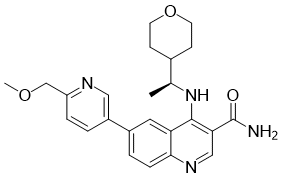For instance, both Johnson et al. and Gehring et al. provided support for the use of Salvianolic-acid-B methylphenidate to treat fatigue, with several limitations including the small number of patients, limited follow-up time, open label design and lack of placebo. As they ignored the effect of placebo, further studies are needed to quantify the placebo effect. Recently there have been several control studies and metaanalyses reported investigating the impact of methylphenidate on CRF. However, these trials showed inconsistent results. For instance, both Butler et al. and Bruera et al. failed to demonstrate any statistically significant benefit of methylphenidate over placebo. On the Ursolic-acid contrary, Cueva et al. showed the effectiveness of methylphenidate in attenuating asthenia in breast carcinoma patients who received chemotherapy. Clinical characteristics are a good predictor of ultimate and long-term response to methylphenidate therapy. Hence, there is need to understand whether specific patient characteristics or other factors are associated with response to methylphenidate used for the treatment of CRF. The purpose of this study is to specifically focus on increasing evidence for the use of methylphenidate in the treatment of CRF and to assess the efficacy and safety of methylphenidate in the treatment of CRF that will enable us to personalize the use of methylphenidate to only the patients who respond to this treatment. Our primary research question was aimed at assessing the effects of methylphenidate on CRF and its safety. This review identified 5 RCTs concerning 498 patients with different types of tumor were enrolled. Despite a large placebo effect observed in the studies included, pooled data suggested therapeutic effect of methylphenidate on CRF and the efficacy of methylphenidate on CRF is getting better with prolonging treatment duration. There was no impact of methylphenidate on depression and cognition associated with CRF. The analysis of serious adverse effects failed to demonstrate any significant differences between groups, except that more patients reported vertigo, anxiety, anorexia and nausea in methylphenidate group compared to placebo group. Fatigue is a frequent complaint among patients with cancer. Currently fatigue is identified by the response to a single item on a more general health questionnaire or from one or two symptom criteria from symptom checklists. FACT-F is a multidimensional fatigue scale and BFI is a multi-item measure of CRF. They are both employed in the studies of CRF. In order to avoid introduction of possible heterogeneity into the results, we didn’t standardize data with different measure tools. The meta-analysis of fatigue examined by FACT-F showed beneficial effect of methylphenidate. Otherwise, no significant effect of methylphenidate was seen in the meta-analysis of fatigue determined by BFI. FACT-F is used to assess both fatigue and its consequences in patients with a variety of cancers receiving various treatments, which is sensitive to change over time. BFI was developed for screening and assessing clinical outcomes in severely fatigued patients with cancer, with limitation to severity assessment. The different profiles of two scales might contribute to the inconsistency between the two meta-analyses. Moreover, moderate heterogeneity and extremely unbalanced weight of the two studies were observed in the pooled data of BFI, which might be one of the potential explanations why therapeutic effect of methylphenidate was not confirmed in the meta-analyses of BFI.  Our data were in accordance with the study of Minton et al., in which they drew their conclusion based on studies with a standardized mean difference of FACT-F and BFI.
Our data were in accordance with the study of Minton et al., in which they drew their conclusion based on studies with a standardized mean difference of FACT-F and BFI.
The effectiveness of methylphenidate mostly came from experience treatment self-control and other drugs control
Leave a reply